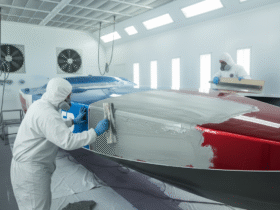Whether you’re stuck in traffic on a hot summer day or just cruising around town, your car’s air conditioning (aircon) system plays a vital role in your comfort and safety. However, despite being one of the most frequently used features in vehicles, many drivers know very little about how their car aircon system works, how to maintain it, and what to do when it fails. In this comprehensive guide, we’ll explore everything you need to know about car air conditioning systems—from basic functionality to common problems and maintenance tips.
What is a Car Aircon System?

A car aircon system is designed to cool and dehumidify the air inside your vehicle. It consists of several key components including:
-
Compressor: Acts as the heart of the system by compressing and circulating refrigerant.
-
Condenser: Removes heat from the refrigerant and condenses it into a liquid.
-
Expansion valve: Controls the amount of refrigerant entering the evaporator.
-
Evaporator: Absorbs heat from the car interior and cools the air.
-
Refrigerant: The chemical compound that circulates through the system to transfer heat.
Together, these components ensure the air in your vehicle remains cool, clean, and comfortable.
How Does Car Air Conditioning Work?
The car air conditioning process follows a closed loop and operates on the basic principles of heat exchange and pressure regulation.
-
Compression: The compressor pressurizes the refrigerant, turning it into a hot, high-pressure gas.
-
Condensation: This gas moves into the condenser where it releases heat to the outside air and becomes a liquid.
-
Expansion: The high-pressure liquid flows through the expansion valve where pressure is reduced.
-
Evaporation: In the evaporator, the low-pressure refrigerant absorbs heat from the cabin air, cooling it. The blower fan then pushes the cool air through your vents.
This cycle continues as long as the air conditioning is on.
Benefits of a Well-Functioning Car Aircon
-
Comfort: Keeps the car interior at a pleasant temperature regardless of outside weather.
-
Safety: Reduces driver fatigue and prevents windows from fogging up, enhancing visibility.
-
Air Quality: Filters out dust, allergens, and pollutants.
-
Preservation: Helps preserve interior components like leather seats and dashboards by controlling humidity.
Signs Your Car Aircon Needs Attention
A malfunctioning car aircon system often shows early warning signs. Here’s what to watch out for:
-
Weak airflow: If the air from your vents is weak or not cooling properly, there may be a blockage or blower issue.
-
Unusual noises: Rattling or grinding noises when the AC is on could indicate a failing compressor or loose parts.
-
Bad odours: Musty or foul smells could be due to mold or bacteria in the evaporator or air filters.
-
Leaking water inside the car: This might be a clogged or disconnected drainage hose.
-
AC not blowing cold air: This could be due to low refrigerant levels, a faulty compressor, or leaks in the system.
Common Car Aircon Problems and Solutions
1. Refrigerant Leaks
Refrigerant is crucial for cooling, and even a small leak can impact performance. A professional can perform a leak test, seal the leak, and recharge the system.
2. Faulty Compressor
The compressor is prone to wear and tear. If it fails, it may need to be replaced entirely. Symptoms include strange noises or complete loss of cooling.
3. Electrical Issues
Modern aircon systems rely on electronics. A blown fuse, faulty relay, or malfunctioning sensor can disrupt the system.
4. Clogged Filters
The cabin air filter can become clogged with dust and debris. Regularly replacing or cleaning the filter can restore airflow and improve air quality.
5. Broken Condenser or Fan
Physical damage or wear can reduce the ability of the system to cool refrigerant. Condensers and fans may need cleaning or replacement.
Car Aircon Maintenance Tips
Regular maintenance can extend the life of your aircon system and keep it working efficiently.
-
Run the aircon weekly: Even in winter, running the AC for 10–15 minutes helps lubricate the compressor seals and prevents gas leaks.
-
Service annually: A professional aircon service checks refrigerant levels, cleans filters, inspects hoses, and checks for leaks or damage.
-
Replace cabin air filters every 12,000 to 15,000 km or as recommended by the manufacturer.
-
Use the recirculation mode in extreme heat to cool the cabin faster and reduce strain on the system.
-
Check refrigerant levels: Low refrigerant means poor cooling and potential system damage.
How Often Should You Service Your Car Aircon?
Experts recommend servicing your car’s air conditioning system at least once a year. However, if you use your AC frequently or notice performance issues, more frequent checks may be necessary. A complete car aircon service typically includes:
-
Evacuating and recharging refrigerant
-
Checking for leaks
-
Cleaning the evaporator and condenser
-
Inspecting compressor function
-
Replacing filters and sanitizing the system
Car Aircon Re-gas: What is it and When is it Needed?
Car aircon re-gas (or recharge) involves topping up the refrigerant gas to ensure optimal performance. Over time, refrigerant levels drop due to natural seepage. If your AC is blowing warm air or not cooling effectively, it’s likely time for a re-gas.
On average, re-gassing is needed every 2 to 3 years, but this can vary depending on your car’s make, model, and usage.
Can You Service a Car Aircon Yourself?
Some minor maintenance tasks like replacing the cabin air filter or cleaning vents can be done at home. However, servicing components like the compressor or handling refrigerant should be left to professionals due to safety and legal regulations surrounding refrigerant handling.
Cost of Car Aircon Service
The cost of servicing your car air conditioning system can vary depending on the type of service, the car model, and any parts that need replacing. Here’s a rough estimate:
-
Basic aircon service: $100–$150
-
Re-gassing: $150–$250
-
Full system diagnostics and repairs: $300 and above, depending on parts and labour
Conclusion
A well-functioning car aircon system is more than a luxury—it’s essential for your driving comfort, health, and safety. Understanding how it works and recognising the signs of trouble early can save you from expensive repairs down the track. With regular servicing and a little preventative care, your car’s air conditioning system can continue to keep you cool and comfortable for years to come.
If your aircon isn’t working as it should, don’t wait until the heat becomes unbearable. Visit a certified automotive air conditioning technician and ensure your system is running at peak performance.











Leave a Review